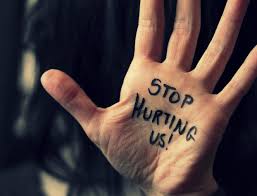 Domestic violence is usually very overt and easy to recognize. Sometimes though, abuse is covert and we may not even realize we are in an abusive relationship. Here you will find help in understanding abuse and identifying whether or not you are in an abusive relationship.
Domestic violence is usually very overt and easy to recognize. Sometimes though, abuse is covert and we may not even realize we are in an abusive relationship. Here you will find help in understanding abuse and identifying whether or not you are in an abusive relationship.
Domestic abuse of any kind is about control. Whether domestic abuse is covert  or overt, it is an immature reaction to a sense of helplessness and feelings of loss of control. Aggression is primitive and immature reactions to a sense of helplessness and feeling a loss of control. Domestic abuse, violet or non-violent is used to keep a sense of safety for the abuser
or overt, it is an immature reaction to a sense of helplessness and feelings of loss of control. Aggression is primitive and immature reactions to a sense of helplessness and feeling a loss of control. Domestic abuse, violet or non-violent is used to keep a sense of safety for the abuser
There are many types of domestic abuse a spouse can inflict upon another spouse. Physical abuse, emotional abuse, verbal abuse, sexual abuse and financial abuse are some common ones. Below are some guidelines that will help you identify and the different types of abuse.
 Ambient Abuse:
Ambient Abuse:
Living in an atmosphere of fear, intimidation and unpredictability. By creating an atmosphere of abuse the abuser avoids direct acts of abuse such as striking their spouse. They can maintain control by manipulating the spouse with threats. Such an environment will erode the victim’s self – worth and self – confidence. In such situations, the abuser’s actions are often referred to as “crazy making” behavior. The victim feels as if they are going crazy but can’t quite put their finger on the reason.
Some examples of ambient abuse would be withholding affection or intimacy, rolling their eyes when you express an opinion or criticizing your actions, “for your own good.”
Disproportionate Abuse:
Does your spouse react with a violent rage to the slightest upset? If your spouse’s reactions to events are exaggerated then you are living with abuse that is disproportionate to the imaged offense. In a situation like this, it does not matter how gently you try to communicate an issue with your spouse, they will respond with a temper tantrum. Your abuser will get your attention and cause intimidation when they react by throwing things, slamming doors, getting in your face or screaming and yelling.
Impossible Situations:
The abuser engineer’s impossible, dangerous, unpredictable, unprecedented, or highly specific situations in which he is needed, depended on or considered the only source of authority, knowledge, skills, or useful traits. Consequently, the abuser generates his own indispensability. In his/her mind and yours, you are completely dependent on him and you should never forget it. The moment you do, he will find someway to put you in your place again.
Objectification:
Most abusers lack empathy. They dehumanize and treat people like inane objects, extensions of themselves, or instruments to be played as they wish. Physical, psychological, verbal and sexual abuses are all forms of dehumanization and objectification. They view their victim as nothing more than a comfortable, old chair that can be easily discarded should it become uncomfortable. In other words, their level of comfort is their only concern and they will sell you down the river to hold onto that comfort.
Abuse By Proxy:
An abuser will recruit friends, neighbors, family members, the police, the media…anyone he can find to threaten you, harass you and manipulate you into doing what they want.
This kind of abuse is often played out in divorce court. A spouse will hire an adversarial attorney to try and punish you. He/she will lie under oath to try and get a judge to rule against you in hopes that you will suffer legal and social sanctions. Of course, before you even went to court they had turned your friends and family against you with lies and manipulations. With a spouse like this, you are lucky to be going through a divorce.
Do you know anyone who has been the victim of Domestic abuse. Share your story and help someone who may need to hear it
 someone or yourself for an offense. It’s a state of grace, nothing you can force or pretend. There are no short cuts.” says Judith Orloff M. D. Forgiveness doesn’t mean that you don’t feel anger or any other emotion. It’s natural to feel angry, to say “I’m not going to let that **** get away with this,” whatever “this” is. However, what does this negative emotion do to you in the mean time. You get sick to your stomach thinking about your need for revenge. Meantime, the person you are angry at or with doesn’t even care or acknowledges your emotion. Forgiveness refers to the actor not the act. Not to the offense but the woundedness of the offender.
someone or yourself for an offense. It’s a state of grace, nothing you can force or pretend. There are no short cuts.” says Judith Orloff M. D. Forgiveness doesn’t mean that you don’t feel anger or any other emotion. It’s natural to feel angry, to say “I’m not going to let that **** get away with this,” whatever “this” is. However, what does this negative emotion do to you in the mean time. You get sick to your stomach thinking about your need for revenge. Meantime, the person you are angry at or with doesn’t even care or acknowledges your emotion. Forgiveness refers to the actor not the act. Not to the offense but the woundedness of the offender.


 A young woman has survived after falling from the 23rd floor of a hotel in the Argentine capital, Buenos Aires.
A young woman has survived after falling from the 23rd floor of a hotel in the Argentine capital, Buenos Aires.




